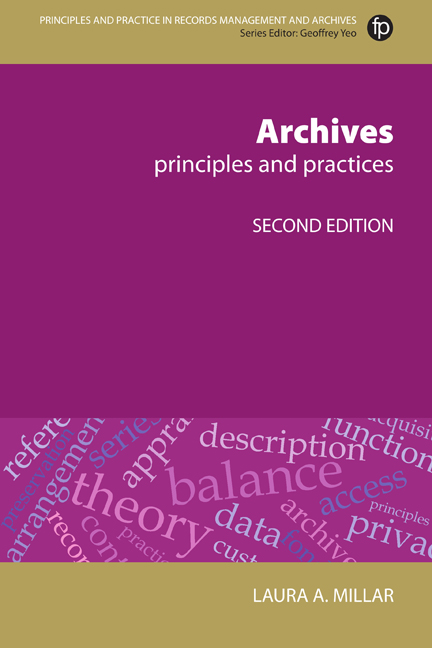Book contents
- Frontmatter
- Contents
- Figures and tables
- Foreword to the first edition
- Foreword to the second edition
- Acknowledgements
- Introduction to the second edition
- PART I ARCHIVAL PRINCIPLES
- 1 What are archives?
- 2 The nature of archives
- 3 Archival history and theory
- 4 The uses of archives
- 5 Types of archival institution
- 6 The principles of archival service
- 7 Balancing access and privacy
- PART II ARCHIVAL PRACTICES
- Conclusion
- To learn more
- Glossary of terms
- Index
- Miscellaneous Endmatter
3 - Archival history and theory
from PART I - ARCHIVAL PRINCIPLES
Published online by Cambridge University Press: 08 June 2018
- Frontmatter
- Contents
- Figures and tables
- Foreword to the first edition
- Foreword to the second edition
- Acknowledgements
- Introduction to the second edition
- PART I ARCHIVAL PRINCIPLES
- 1 What are archives?
- 2 The nature of archives
- 3 Archival history and theory
- 4 The uses of archives
- 5 Types of archival institution
- 6 The principles of archival service
- 7 Balancing access and privacy
- PART II ARCHIVAL PRACTICES
- Conclusion
- To learn more
- Glossary of terms
- Index
- Miscellaneous Endmatter
Summary
No theory is good except on condition that one uses it to go beyond.
Andre Gide (1869–1951) Journals, 5 August 1931While the concept of archives as evidence is considered a central component of archival theory and practice today, it was not always thus. Across the centuries, the reasons archives were valued and ways in which they were preserved varied according to local custom or inclination. No doubt, future generations will define archives and evidence differently; such is the nature of a discipline that manages the products of information and communications. As information and communications change, society's sense of the worth of documentary products must also change. I have no ability to predict the future, but I believe strongly that we can learn from the past. So in this chapter I offer an extremely brief overview of the history of archival development, summarizing ideas captured in countless archival texts. Then I introduce central archival theories and principles and place them within that historical framework. I end the chapter by considering how archival theories and principles are being challenged today.
Trends in archival history
We have had archives – documentary evidence – since before we have had records as we define them today. Pictographs have evidential value, as do stone stele, clay tablets and totem poles, if one can read the visual or symbolic content and capture the meaning. With such a long past, tracing the evolution of archival milestones over several centuries can only offer a whisper of the deep and complex history of the materials themselves and the people who manage them. But this overview, concise as it must be, will help orient the reader to the changing perception of the role and use of archives in different times and places.
Archives for church and crown
For millennia, archives were considered the sole property of the agency that created them, be it church, state or sovereign. Whether on papyrus, leather or bone, early records were preserved for their owner and most assuredly not for the public. The discovery of hundreds and thousands of clay tablets from as early as the 2nd millennium BC in archaeological sites in Syria, Egypt and Turkey provide clear evidence of the desire by ancient societies to create and preserve records, whether for short-term use or later reference.
Information
- Type
- Chapter
- Information
- ArchivesPrinciples and Practices, pp. 37 - 66Publisher: FacetPrint publication year: 2017
Accessibility standard: Unknown
Why this information is here
This section outlines the accessibility features of this content - including support for screen readers, full keyboard navigation and high-contrast display options. This may not be relevant for you.Accessibility Information
- 1
- Cited by
